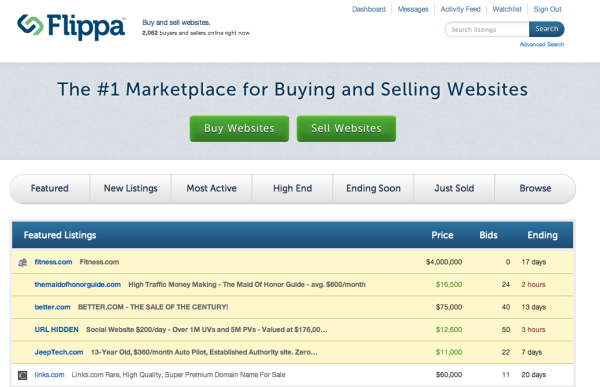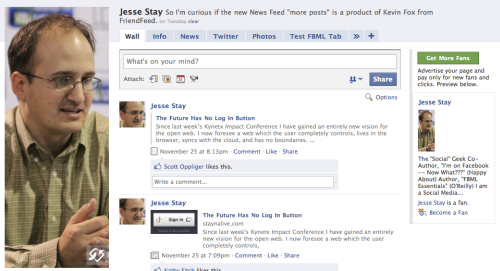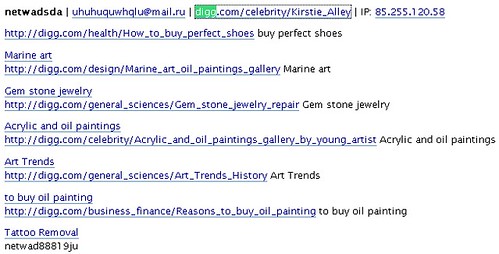This is a guest post from Andrew Knibbe, Marketing Manager at Flippa. Scroll down for a special offer from Flippa!
Patrick Meninga’s post a few weeks back mentioned his experiences in building and ultimately selling his website. Apart from a great how-to on starting up a site, it highlights the growing trend to buying websites rather than starting from scratch.
Why Buy?
Like Patrick, anyone who’s tried starting a site from scratch will know first-hand how much work it can be to attract and retain an audience. It’s typically a relentless slog of design, content generation, social media engagement, backlinking, and analysis – with the overriding risk that it will all amount to naught.
By buying instead, you can get a proven website where you can focus on growing the site rather than getting than initial traction.
A number of SEO pros are also starting to buy websites based on the keywords they rank for, or the Twitter and Facebook accounts that are attached to the sites.
The steps below provide a high-level view of the sorts of things website buyers consider when buying a website.
Where to Buy
There are two main avenues for buying websites: keep an eye on website marketplaces, or approach owners of websites directly.
I work for Flippa, the largest website marketplace around, so I can readily talk to the first option – it blows people’s minds to discover that people are actually buying and selling websites like this. It’s a sign of the times!

Most marketplaces will work to make it as easy as possible to find sites for sale, provide buyers with as much information as possible about the site being sold (revenue, traffic age, backlinks, ranking keywords, verified Google Analytics, Copyscape checks), then facilitate the sale – typically via auction or private sale.
The alternative is to buy directly from the existing website owner. This can be time consuming in that the majority of website owners have no intention of selling – especially if it’s an actively maintained website. The way to address this is to find sites where the owner may have lost interest. One trick is to find sites where the copyright details have not been updated recently. For example, trawling through the results of a search for “Copyright © 2009 pets” can give you sites that rank for “pets” but have potentially not been updated for a while.
Due Diligence – Check the Facts
Once you have located a website for sale, it is incredibly important that you verify an owner’s claims around revenue, traffic, and age, and do some digging to ensure there are no problems waiting behind the scenes that will impact the value of the website.
Most website owners who are looking to sell their site will be open to you verifying their claims. Many website buyers will ask for a screenshare session with the seller to validate their revenue, profit, and traffic records. Sellers may also be open to providing you with third party documentation such as bank statements.
Remember to account for the time the website owner spends on the website. For example, if you’re buying a blog where the current owner is the sole contributor and spending 40 hours a week writing content, then a revenue figure of $1,000 a month may not be especially compelling.
It’s especially important to understand the key drivers of both revenue and traffic. If the site relies heavily on organic search engine traffic, be sure to validate dependencies such as backlink sources to ensure its has long-term viability.
Work out a Valuation
Now that you’ve located a site to buy and have worked out whether it’s worth buying, it’s time to work out what the website is worth. It can be a tricky task.
The general rule of thumb for revenue earning sites tends to be valuations at 12 to 36 months revenue. It is highly variable depending on the niche in which the website is in (e.g. sites about internet marketing usually go for lower multiples than sites about sports) as well as any risk factors identified as part of the due diligence activity.
This becomes more complex for websites where more of the value is in existing traffic rather than existing revenue (a problem I’m sure the guys at Pinterest are totally fine with). Again, the niche will define the value of the audience here.
Still unsure about a valuation? Try entering some of the website’s metrics into our advanced search page at https://flippa.com/search and you can get an idea of what the market is paying for similar sites. You can include all listings to get a feel to where bidding reached (or didn’t reach) – even for unsold sites.
Going Through with the Transaction
There are a few final items to bear in mind as part of your communication with the seller.
The first of these is drafting a sales agreement. Website marketplaces provide free template sales agreements as part of the service; however, it’s important to understand the terms you are agreeing to.
One particular area of focus should be agreeing on the extent to which the previous website owner will be involved with the website post transaction. Most buyers and sellers agree on some sort of hand-over period for this.
Another item to consider is getting a non-compete agreement in place to ensure the previous owner does not end up becoming one of your competitors.
Finally, for any serious transaction, it’s worth agreeing to use an escrow service such as Escrow.com for payment. This involves the buyer paying the agreed-upon funds to escrow, the seller transferring the website to the new owner, then the buyer releasing the funds once the agreed assets are in their possession. This will give both parties some level of confidence in the transaction being successful.
We’ve covered a great deal here in terms of the process and considerations when buying a website. If you really are interested, I’d suggest you take the time to watch a few live sales happen, so you get a feel for the sorts of valuations in the market. Also, consider the wealth of available resources such as blogs and forums which will be able to give you a deep dive on any of the topics mentioned here.
An exclusive offer for Techipedia readers – we’re giving away $20 in credits for the first 20 readers who redeem them using the credit code techipedia. This is especially valuable for any website owners who are now inspired to sell!




